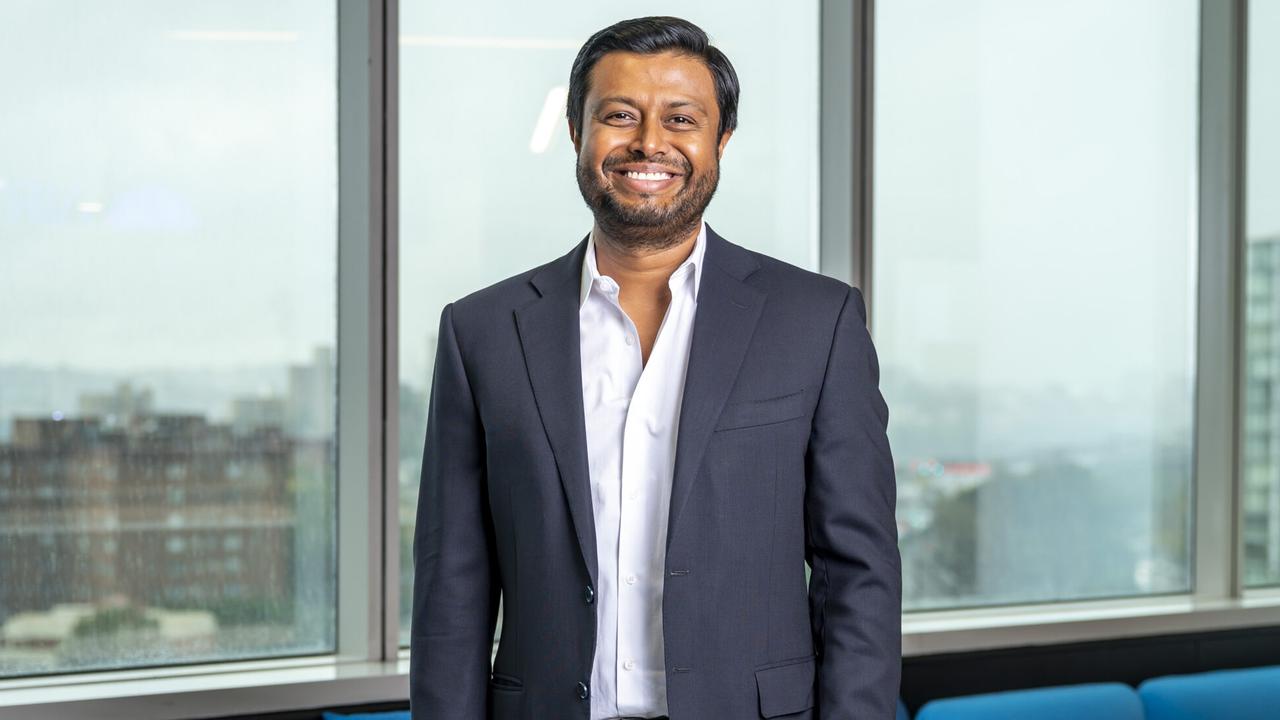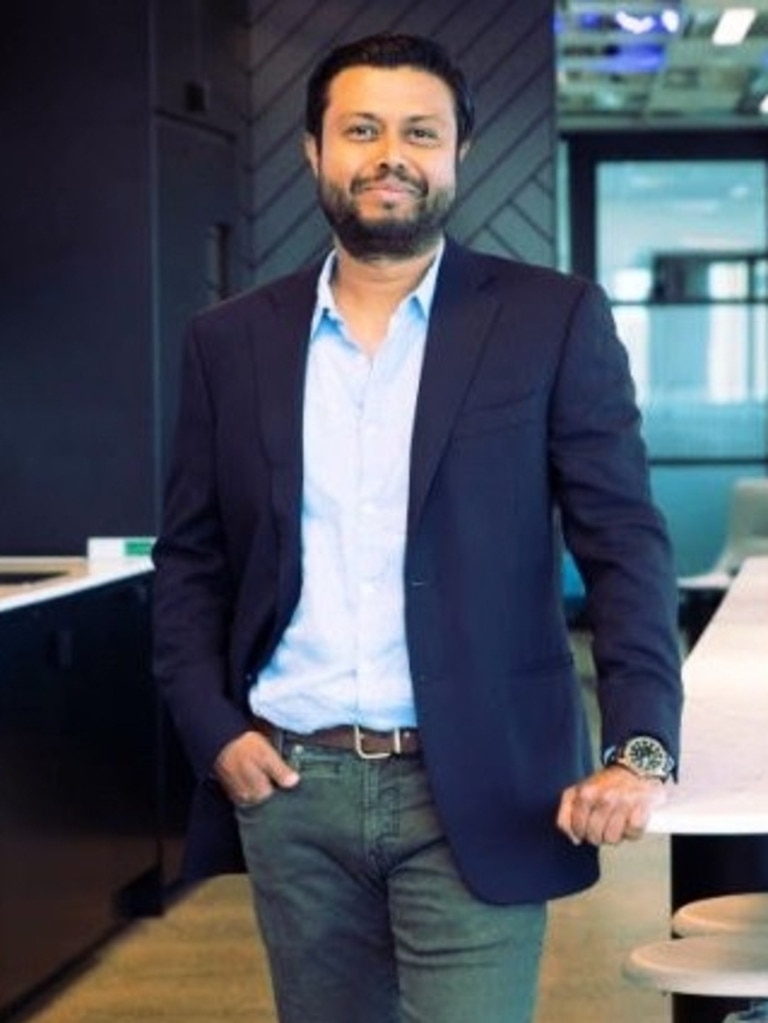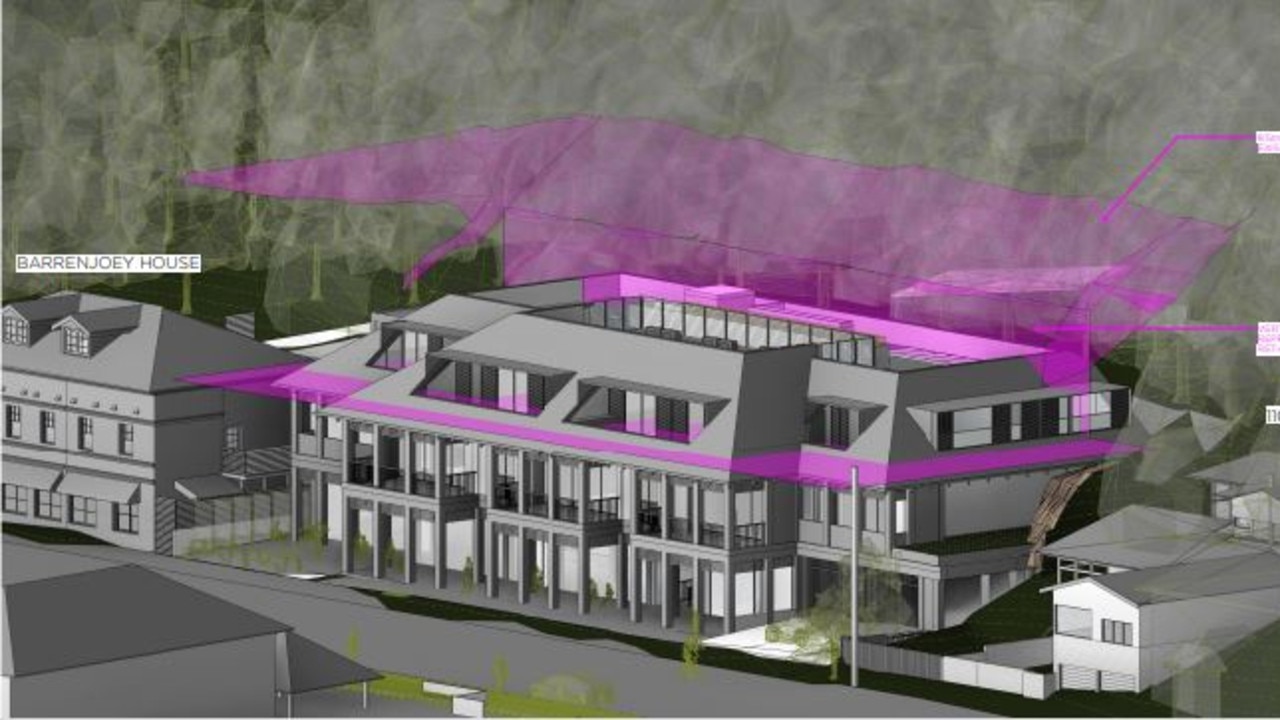Inside the career of AirTrunk’s Robin Khuda
AirTrunk’s boss, who arrived in Australia 26 years ago as a bright-eyed student, says its $24bn sale is ‘an extremely proud moment’.

Business
Don't miss out on the headlines from Business. Followed categories will be added to My News.
Robin Khuda, the Sydney-based chief executive of AirTrunk, has struck a near $3bn payday for himself and colleagues at the data centre company he founded almost a decade ago.
The payout represents their jointly owned share of the blockbuster $24bn sale of AirTrunk, which took place on Wednesday night and is among Australia’s largest ever takeovers.
It also marks the end of a nine-year solo journey for the 45-year-old who confirmed he will remain CEO under guidance of AirTrunk’s new parent, US alternative asset manager Blackstone.
“Today is an extremely proud moment for AirTrunk, and for me personally,” Mr Khuda said on Wednesday night. “Not many founders get the opportunity to build a $24bn business in less than a decade.”
“Our journey has never been easy, we’ve faced so many adversities, and we always came out stronger and more resilient.”
He paid tribute to his team’s “vision and execution” across all areas of the business.
“This transaction evidences the strength of the AirTrunk platform in a strong performing sector as we capture the next wave of growth from cloud services and AI and support the energy transition in Asia Pacific,” Mr Khuda said.
Mr Khuda, who arrived in Australia as a student 26 years ago at the age of 18, is a former NextDC executive, who cut his teeth under the lead of its CEO Craig Scroggie and founder Bevan Slattery.

He is a certified practising accountant by trade who studied a Bachelor of Business in Accounting at the University of Technology in Sydney.
He also has an MBA in finance from the Manchester Business School in the UK, and has completed an executive strategy program at Harvard University and an executive program on mergers and acquisitions at The Wharton School.
Before founding AirTrunk, Mr Khuda led the local arm of Fujitsu, finishing up a little more than a two-year career as its Australian and New Zealand general manager of operations in 2009.
At Fujitsu, he’d helmed the company’s cloud computing and data centre business, but in his next role, at Pipe Networks, he was chief financial officer and oversaw the company’s $373m merger with Australia’s third-largest telco TPG.
Pipe Networks was co-founded by Bevan Slattery, who was so impressed with Mr Khuda he brought him into another of his internet ventures.
That venture, ASX-listed data centre developer NextDC opened its 17th data centre in Australia on Wednesday.
Mr Khuda described his time in that role on Microsoft-owned jobs platform LinkedIn.
“Involved since day one of the business and managed NEXTDC’s successful IPO in 2010 and subsequent Capital Raisings (in excess of $200m capital raising),” it reads.
“Played a key role in growing NEXTDC from a start-up company to a successful ASX-300 company with approximately $500m market capitalisation in less than three years.”
In June 2013, he left to work on what would soon become AirTrunk.
In February this year, the Asia Pacific-focused data centre developer further opened its global headquarters in North Sydney.
The location on Walker Street, alongside the likes of global tech giants SAP and Oracle, was strategic, said Mr Khuda, who added that AirTrunk wanted to keep its roots in the city it was founded in.
“It’s fitting that Sydney is home to our new global headquarters; it is where AirTrunk was founded less than 10 years ago, is home to three campuses that make up the largest total capacity of any single city in our portfolio, and is where the majority of our employees reside,” he said at the time.
“We established this new HQ, along with our regional head offices in Singapore and Japan, to accommodate our growing team of AirTrunkers who are enabling AirTrunk’s rapid expansion throughout the APJ region.”
While Mr Khuda has been relatively quiet about his own career, he hasn’t been quiet about his plans to buy, sell and develop property.
He has splashed his fortune several times across the Sydney and Melbourne property market, with the Mossman local having bought and sold a number of homes on the lower and upper north shore.
In 2021, Mr Khuda paid $20m for a house on Balmoral slopes and followed it up the next year with the $11m purchase of the house next door.
That small street is considered one of the most coveted in the suburb given its location, less than 400m from the beach, and the number of parcels of land which was 21 before Mr Khuda proposed a $45m plan to combine his two homes.
He has also tried his hand at development, proposing a $13.5m five-unit block on Barronjoey Road with retail stores and a basement car park.
It was to be developed on the site of the old Palm Beach Fish and Chips shop which he picked up for $6m.

But that plan wasn’t met with the same enthusiasm he shares for property, with the Northern Beaches Council knocking it back in August last year after the council received near 100 submissions opposing its development above local zoning rules.
In Melbourne he had better luck with his development arm Ondas receiving approval for a $22m 16-apartment and retai development on a St Kilda site spanning 1603sq m near The Esplanade on Fitzroy St.
The AirTrunk sale will shoot Mr Khuda higher into the ranks of Australia’s richest people. He was listed with an estimated wealth of $1.03bn in The Australian’s Richest 250 earlier this year.
Blackstone and Mr Khuda are yet to respond to requests for comment from The Australian, but insiders have given some detail on the $23bn deal set to be announced this week. Sources said the deal could be announced as early as Wednesday.
What Blackstone is getting in return for its mega deal is a total of 11 data centres across the Asia Pacific, including three in Sydney and one in Melbourne.
The remaining seven data centres include one in Malaysia in Johor Bahru, three in Hong Kong, two in Tokyo and one in Singapore.
When Mr Khuda founded AirTrunk, he didn’t take on his old boss directly, but rather he skirted the neighbouring opportunities in Asia, where NextDC today is increasingly making its push.
Blackstone’s interest in AirTrunk had been obvious for months, with the New York firm long considered the favourite buyer and one of few parties with the firepower to pull off a $24bn purchase.
The US company’s interest in data centres began several years ago. It acquired the former Britishvolt industrial site in northeast England earlier this year with plans to build a large data centre.
That project was reported as having earmarked investment of up to £10bn ($19.4bn) in the region.
Macquarie Group and Canada’s PSP Investments publicly disclosed their combined stake in AirTrunk after the sale on Wednesday, which total 88 per cent. Mr Khuda and staff own the remainder of the company, with Mr Khuda confirming he would relieve some of his stake as part of the sale.
The ownership split will trigger a lucrative payday for Macquarie, which made its AirTrunk investment through its second Asia-Pacific Infrastructure Fund.
Originally published as Inside the career of AirTrunk’s Robin Khuda








